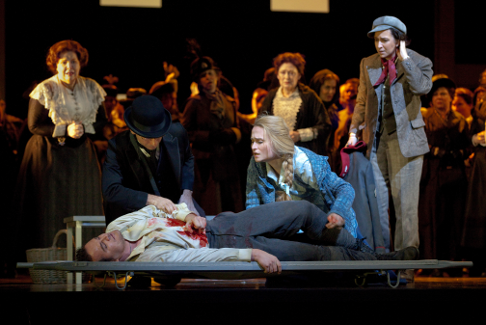Aside from the Met's current production of Wagner's Ring Cycle, it was the first opera I'd seen. Why Faust? Jonas Kaufmann sounded amazing as Siegmund in Die Walkure this past spring. That's about it, really. Gotta start somewhere!
This production of the Faust tale had a Concept. And that Concept (the capital C is very important) is as follows: Faust is a nuclear physicist who sees the destruction he has created and gives up on life. That's why he makes his deal with Mephistopheles.
I will say this for Faust: to my untrained ears, I'm sure the music and singing were beautiful. I have no qualm with any of the singers.
But I do think that between director Des McAnuff (hypothetically) leaping to his feet and deciding that "between world wars" was a brilliant setting, and the production actually opening at the Met, something may have been lost in translation. Or maybe we shouldn't have trusted the director of Jersey Boys with Faust.
Because I would have been fine with a period setting, characters in suits and hats, soldiers marching off to war. But Faust here became a nuclear physicist sick of his work, and that would have been fine, if the production didn't drop the concept after the first scene, only to occasionally wave it in your face once or twice after. Transitioning from Marguerite killing her baby to a team of scientists watching an A-bomb detonate looked great on paper, I'm sure. It even works (sort of) as a metaphor for the complete implosion of her sanity which follows. But you have to be careful with your concepts because on stage, it serves to startle the audience awake with a "hmm? We're still going with that idea? Oh, okay..." By this point it's three hours later, and we've completely forgotten that there was a scientific element to the production at all.
Bringing an 1859 opera into the modern era is a daunting task, I'm sure. But clothing your angelic choir in lab coats and using a giant fluorescent cross during Marguerite's salvation looked quite retarded and took me completely out of the world of the opera. And what the hell happened at the end? Marguerite is saved, bright lights, and then suddenly Faust is in his laboratory from the beginning, and old man again, and drinks poison. Was the whole thing a flashback? Did Mephistopheles turn him old before claiming his soul? DID Mephistopheles claim his soul? He seemed to die pretty peacefully to me! The ending of a good Faust tale is many things; confusing should not be one of them.
Also, Gounod himself. The behind-the-scenes presenter, Joyce DiDonato, said that everybody at the time knew the Faust story back-to-front, so Gounod thought he might focus a little on Marguerite. Except it doesn't work, because Marguerite's an idiot, and I don't really care about her story. I came to see a scholar make a deal with Satan and ruin his life, not to see Marguerite go nuts and ruin her life. And I don't know if this is Gounod's fault or the conductor's, but the entire third act dragged. Ponderously laboring towards an end. Oh my god, it's been four hours and we all know the ending, please get a move on.




No comments:
Post a Comment